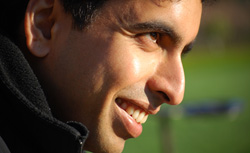Salman Khan, Founder of Khan Academy
His folksy lectures are revolutionizing how kids learn math and science.
Before he started the most popular education site on the Web, Salman Khan was neither an educator nor an entrepreneur. His outsider status helps explain why he's been able to solve a problem that schools and other startups never could: how to harness technology to change the way kids learn.
Back in 2004, Khan was a 28-year-old hedge-fund manager in Silicon Valley looking for a way to help his cousin with her seventh-grade math homework. His solution: use Yahoo Messenger's Doodle feature to illustrate his points as he talked to her on the phone. Thanks to these homespun visual aids, his lectures leapt to life. Soon he began posting videos of his doodles on YouTube to accommodate his other cousins, and their friends, and their friends' friends. In 2009, Khan quit his day job to focus on making the videos full-time.
At last count, Khan Academy offered some 2,400 videos—all available for free on YouTube—covering topics from basic arithmetic to thermodynamics to the Napoleonic Wars.Hundreds of interactive practice exercises let kids put their newly acquired knowledge to work. The service, run as a nonprofit, reaches students across the world and is catching on with adults: Bill Gates and his son both love Khan's work.
There's nothing high-tech about Khan Academy. Nor is the concept entirely novel: Recorded lectures have been around at least as long as VCRs. It's the execution that sets Khan's site apart from the litany of failed ventures in educational technology.
Indeed, Khan Academy's success is unthinkable without Khan himself. Unconstrained by the need for approval from a district office, a teachers' union, or shareholders, he honed his service to meet the needs of the education world's most overlooked constituent: the student. Khan's videos—each shot in a single take—appeal because of, not in spite of, their lack of polish: He comes across as a smart friend whose goal is to help you learn something, not monetize a product.
A counter on the top left of the Khan Academy website testifies, McDonald's-style, to the unprecedented scale of his success—more than 66 million lessons delivered. Khan Academy can't replace a real school, of course. Critics point out—and Khan acknowledges—that school is about more than lectures and drills.
His latest project, though, suggests that Khan Academy could revolutionize how our education system works. Khan has teamed with California's Los Altos School District to develop a hybrid-learning model in which teachers fully integrate the website into their curricula. The goal is to "flip the classroom," so kids watch lectures at home and then bring their homework to school. This model liberates teachers to serve as hands-on mentors, and allows them to track each student's progress through the website's analytics.
Khan has already exploded the notion that educational technology has to be slick to reach a wide audience. If he can relegate the boring classroom lecture to the history books, he'll be a hero to kids everywhere.
Read a Q&A with Salman Khan.
Watch Khan's TED talk on "flipping the classroom," as well as Khan Academy videos on calculus and the origins of the Earth.
Check out the rest of our technology Top Right:
Cynthia Breazeal, director of the Personal Robots Group at the MIT Media Lab.
Jeff Bezos, founder and CEO of Amazon.com.
David Ferrucci, lead researcher for IBM's Watson project.
Brian Tucker, president of GeoHazards International.


